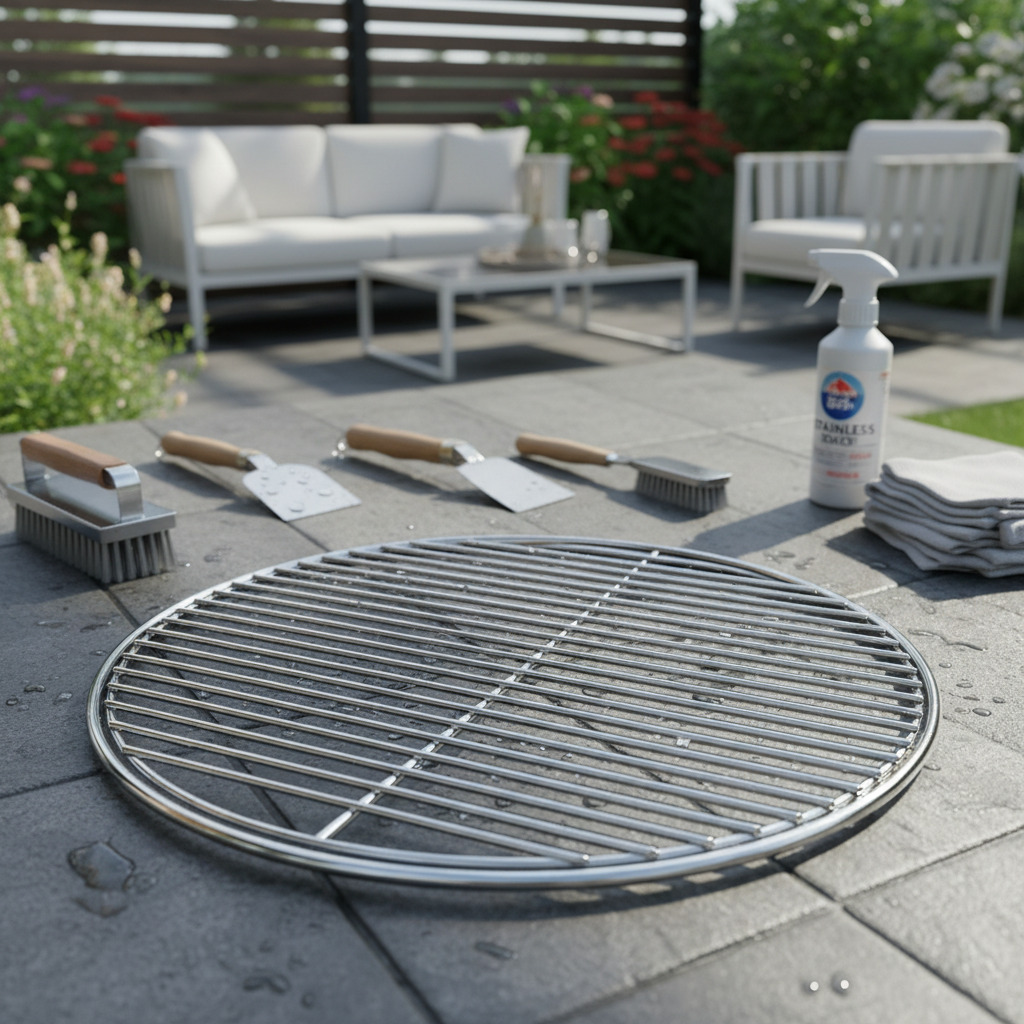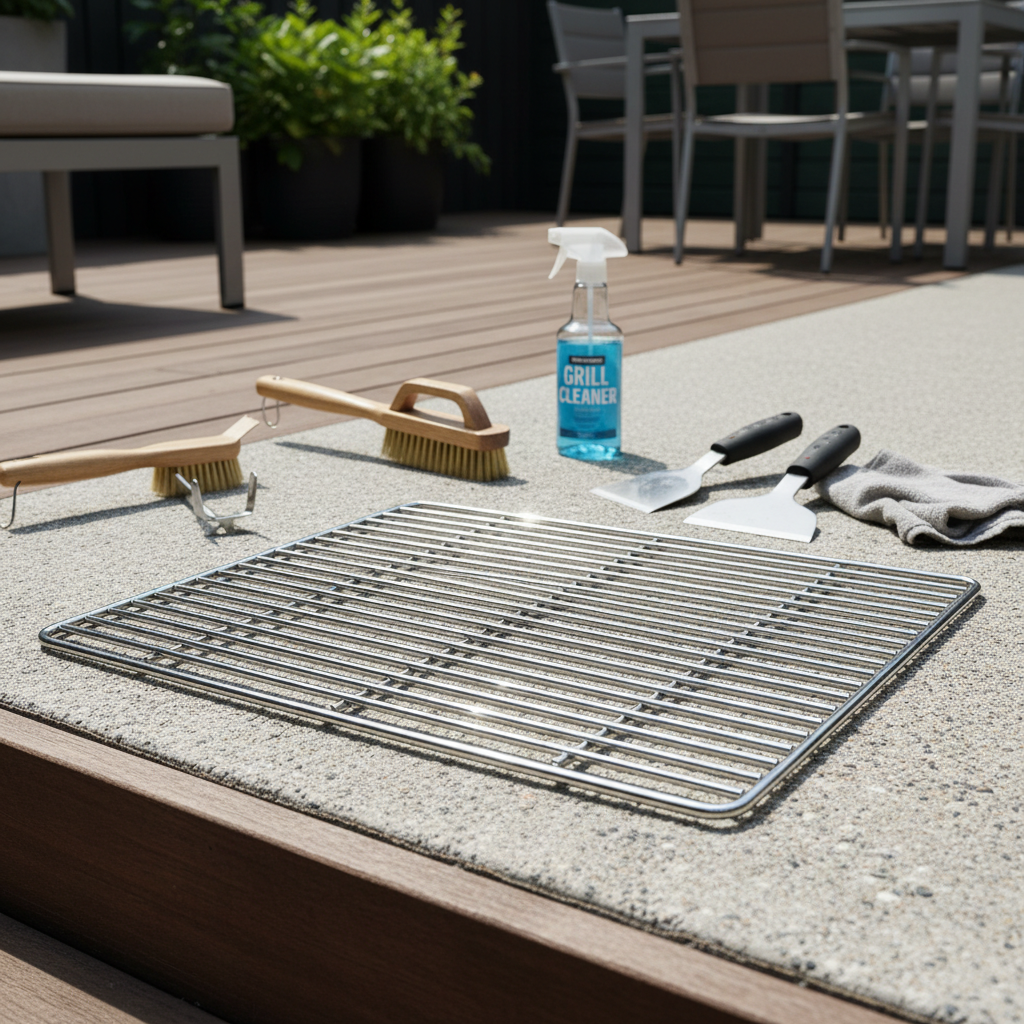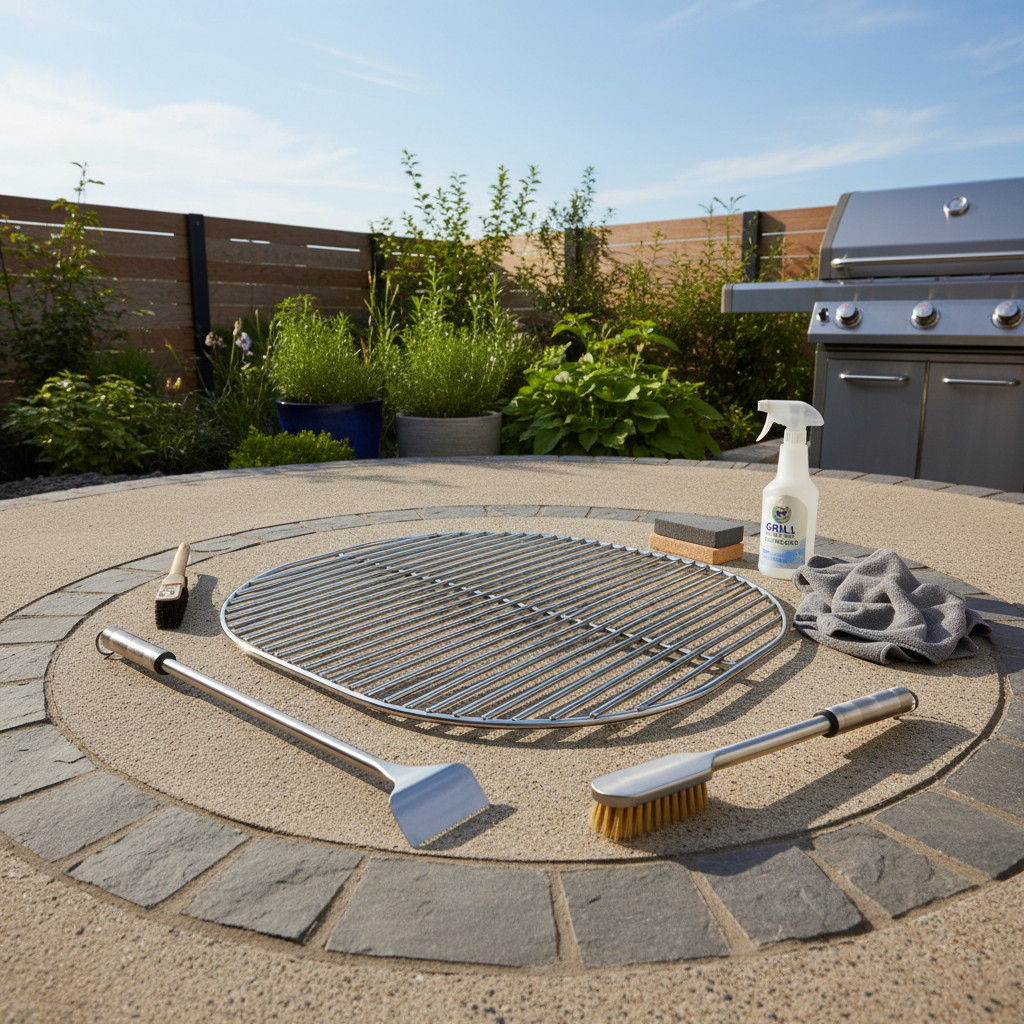
BBQ Grate Cleaners Compared: Find the Right One for Your Grill
Introduction

There’s nothing quite like the sizzle and aroma of a backyard BBQ. But as delicious as that perfectly grilled steak or burger is, the aftermath can be less appealing: grimy, caked-on residue clinging to your grill grates. A clean grill isn’t just about aesthetics; it’s fundamental to food safety, flavor, and the longevity of your BBQ. With a myriad of BBQ grate cleaners on the market, choosing the right one can feel overwhelming. Do you opt for a heavy-duty chemical spray, a classic wire brush, or a more eco-friendly solution?
At BBQCleaner.com, we understand the importance of a pristine cooking surface. This comprehensive guide will help you navigate the vast landscape of grill grate cleaners, comparing their pros and cons so you can confidently select the best option for your specific grill and cleaning needs.
Why Clean Your Grates?

Before diving into the types of cleaners, let’s quickly reiterate why keeping your grates spotless is crucial:
- Better Flavor: Old, charred residue can transfer bitter, burnt flavors to your fresh food. Clean grates ensure pure, delicious taste.
- Food Safety & Hygiene: Leftover food particles can harbor bacteria and attract pests. Regular cleaning prevents this build-up.
- Prevents Sticking: A clean, well-maintained grate is less likely to cause food to stick, making flipping and removal easier.
- Extends Grill Lifespan: Grease and food acids can corrode your grates over time. Cleaning protects your investment.
- Even Cooking: Clean grates allow for more consistent heat distribution, leading to more evenly cooked meals.
Types of BBQ Grate Cleaners
Let’s break down the most popular categories of BBQ grate cleaners available today.
Brushes & Scrapers
These are often the first tools grill masters reach for.
Wire Bristle Brushes
The classic choice, wire brushes are effective at scraping off tough residue. However, they’ve faced scrutiny due to the risk of bristles breaking off and potentially getting into food. If you use one, always check your grates thoroughly before cooking.
Bristle-Free Brushes
A safer alternative, these brushes often use coiled wire, abrasive pads, or sturdy mesh to clean without the risk of loose bristles. A good Safe Grill Brush (Bristle-Free) is an excellent choice for peace of mind.
Wooden Scrapers
Designed to naturally conform to the shape of your grates over time, wooden scrapers offer a bristle-free, chemical-free cleaning option. They require a bit of initial “breaking in” but become very effective. Consider a Safe Scrub Wooden Grill Scraper for a natural, safe approach.
Metal Scrapers
Heavy-duty metal scrapers are great for tackling thick, caked-on grease, especially on flat-top griddles or very stubborn grill grates. They require careful use to avoid scratching delicate grate finishes.
Sprays & Degreasers
These chemical solutions are designed to dissolve grease and grime, making them easier to wipe away.
Specialized Grill Cleaning Sprays
Formulated specifically for grill grates, these sprays penetrate and break down baked-on food and grease. Many are safe for various grate materials. A general Grill Cleaning Spray/Degreaser can be very effective for regular cleaning.
Heavy-Duty Oven & Grill Cleaners
For extremely stubborn, long-neglected grates, industrial-strength oven and grill cleaners can work wonders. Products like Easy-Off Professional Oven & Grill Cleaner are highly effective but require careful handling, good ventilation, and often protective gear. Always check if they’re safe for your specific grate material (especially porcelain-enameled).
Dawn Powerwash & Similar Dish Sprays
While not exclusively marketed for grills, the powerful degreasing action of products like Dawn Powerwash can be surprisingly effective on moderately dirty grates, especially when combined with hot water and scrubbing.
Natural & DIY Methods
For those preferring chemical-free cleaning, or if you’re in a pinch, these methods are excellent.
Baking Soda Paste
Mixing Food-Grade Baking Soda with a little water creates an abrasive paste that can gently scrub away grime. Apply, let sit, then scrub and rinse. It’s safe for all grate types.
Vinegar Spray
A solution of white vinegar and water (50/50) can help loosen light grease and act as a disinfectant. Spray on, let sit, then scrub.
Steam Cleaning
Heating your grill to high temperatures, then using a wet rag (held with tongs!) to steam-clean the grates can loosen charred bits. Some specialized steam brushes are also available.
Cleaning Stones & Blocks
These abrasive blocks are excellent for powerful, bristle-free scrubbing.
Pumice Stones / Grill Bricks
Made from porous, abrasive material, a Grill Cleaning Stone or brick conforms to your grates as you use it, providing strong scrubbing power without scratching or leaving bristles. They are very effective for caked-on carbon and grease.
Cleaning Wipes
For quick touch-ups or light cleaning, specialized grill cleaning wipes offer convenience. They are pre-moistened with cleaning solutions and are perfect for a rapid clean after a small cookout.
Factors to Consider When Choosing
The “best” cleaner depends on several variables:
- Grill Grate Material:
- Cast Iron: Can handle abrasive tools and strong degreasers, but needs re-seasoning after deep cleaning.
- Stainless Steel: Durable, can use most cleaners, but avoid harsh abrasives that can scratch.
- Porcelain-Enameled: Very delicate. Avoid wire brushes and highly abrasive cleaners that can chip or scratch the enamel, leading to rust. Gentle sprays, bristle-free brushes, and natural methods are best.
- Level of Grime: Light residue might only need a quick brush; heavy, baked-on char might demand a spray or cleaning stone.
- Safety Concerns: If you’re wary of wire bristles, opt for bristle-free brushes, scrapers, or stones. When using chemical sprays, ensure good ventilation and wear Disposable Nitrile Gloves.
- Ease of Use: Sprays and wipes offer convenience, while brushes and scrapers require more manual effort.
- Environmental Impact: Natural methods and reusable tools are more eco-friendly than chemical sprays or disposable wipes.
Top Picks & Recommendations
Based on common scenarios, here are our top recommendations:
- For Heavy-Duty Grime: A powerful degreaser like Easy-Off Professional Oven & Grill Cleaner, followed by a sturdy bristle-free brush or a grill cleaning stone.
- For Regular Maintenance (Quick Clean): A bristle-free brush or a Safe Scrub Wooden Grill Scraper while the grill is still warm.
- For Porcelain-Enameled Grates: Gentle cleaning sprays, a bristle-free brush with soft pads, or natural methods like baking soda paste.
- For Eco-Conscious Grillers: Baking soda and vinegar, a wooden scraper, or a Grill Cleaning Stone.
Tips for Effective Grate Cleaning
No matter which cleaner you choose, these tips will maximize your cleaning efforts:
- Clean While Warm: The best time to clean your grates is right after you’ve finished cooking, while they’re still warm. The heat helps loosen food particles.
- Pre-heat if Cold: If your grates are cold, pre-heat the grill for 10-15 minutes to burn off some residue and make scrubbing easier.
- Scrape First: Use a scraper or brush to remove as much loose residue as possible before applying sprays or pastes.
- Allow Soaking Time: If using a spray or paste, let it sit for the recommended time (or longer for natural methods) to allow it to break down the grime.
- Rinse Thoroughly: After cleaning with chemicals, always rinse grates thoroughly with water to remove any residue.
- Dry & Re-season (Cast Iron): For cast iron, dry immediately after rinsing and apply a thin layer of cooking oil to prevent rust and maintain seasoning.
- Protect Your Hands: Always wear appropriate protective gear, like Disposable Nitrile Gloves, especially when using chemical cleaners.
- Wipe Down: Finish by wiping down your grates with a clean cloth or Microfiber Cleaning Towels to remove any last bits of residue and leave them gleaming.
FAQs
- Q: How often should I clean my grill grates?
- A: Ideally, you should do a quick scrape after every use while the grill is still warm. A deeper clean, involving sprays or stones, is recommended every 3-5 uses or monthly, depending on how frequently you grill and how messy it gets.
- Q: Can I put my grill grates in the dishwasher?
- A: It depends on the material. Porcelain-enameled and some stainless steel grates might be dishwasher safe, but always check your grill’s manufacturer instructions. Cast iron grates should never go in the dishwasher as it strips their seasoning and promotes rust.
- Q: Are “bristle-free” brushes truly safer?
- A: Yes, bristle-free brushes significantly reduce the risk of metal bristles breaking off and potentially contaminating food. They are generally considered a safer alternative to traditional wire bristle brushes.
- Q: My grill grates are really rusty. Can I save them?
- A: For light surface rust, a strong scrubbing with a wire brush, steel wool, or a grill cleaning stone, followed by a thorough cleaning and re-seasoning (for cast iron), can often save them. For heavy rust, especially if the metal is corroding through, replacement might be the safest option.
At BBQCleaner.com, we believe a clean grill leads to a better grilling experience. By understanding the different types of grate cleaners and considering your specific grill’s needs, you can easily maintain a sparkling clean cooking surface, ensuring delicious, safe meals every time.
BBQCleaner.com is a participant in the Amazon Services LLC Associates Program, an affiliate advertising program designed to provide a means for sites to earn advertising fees by advertising and linking to Amazon.com.
